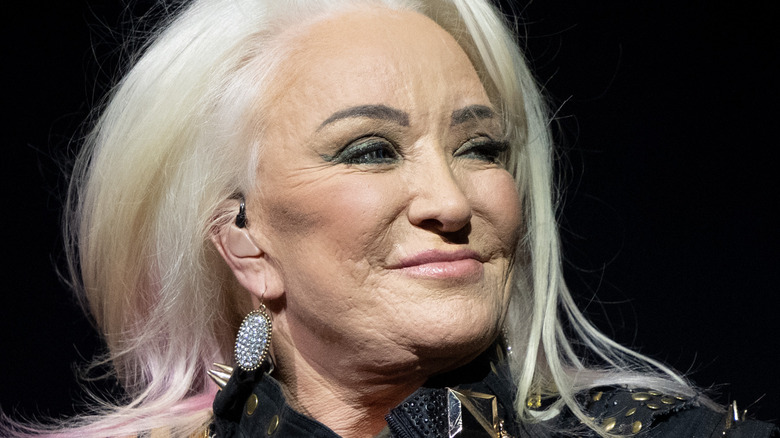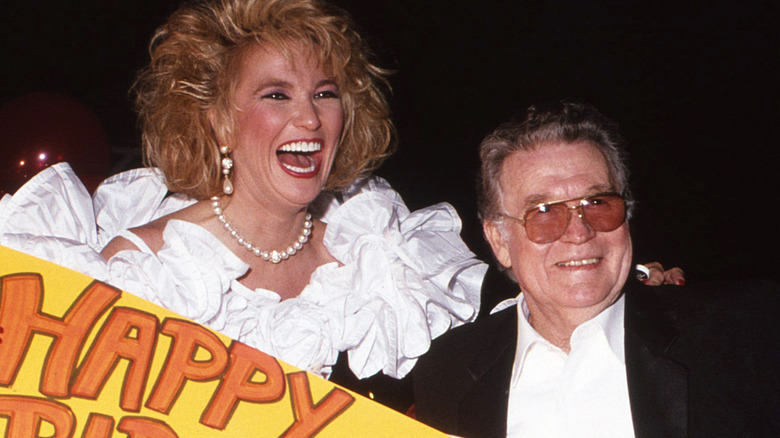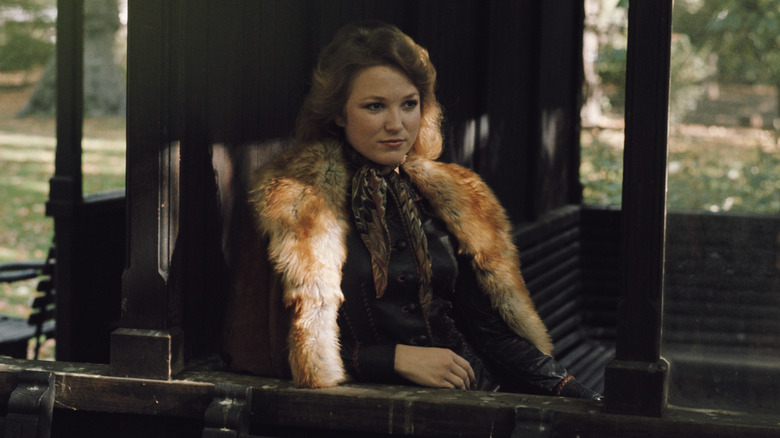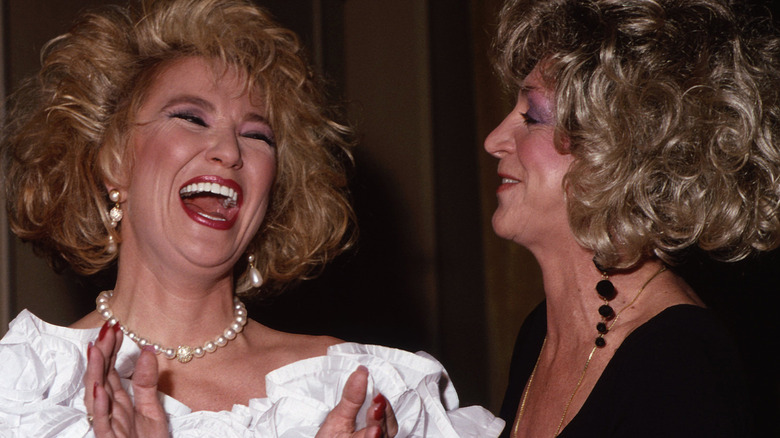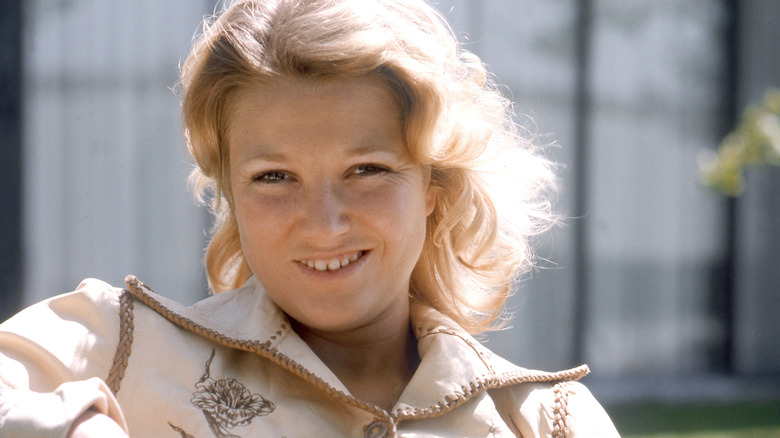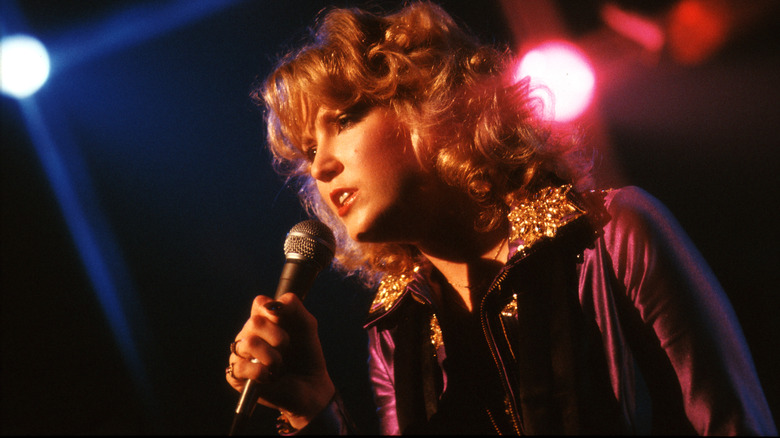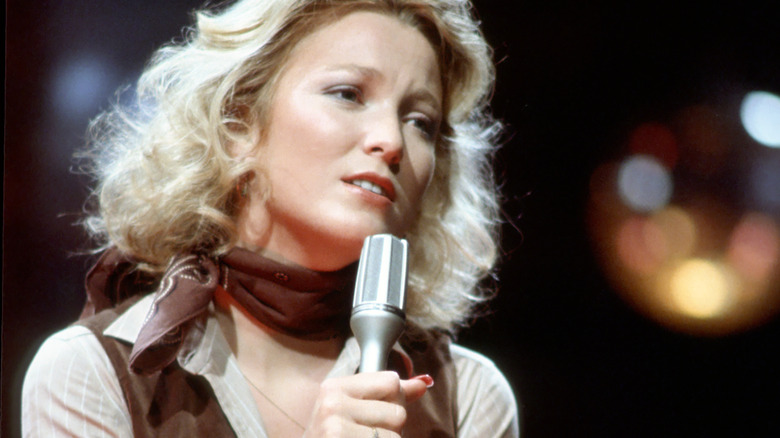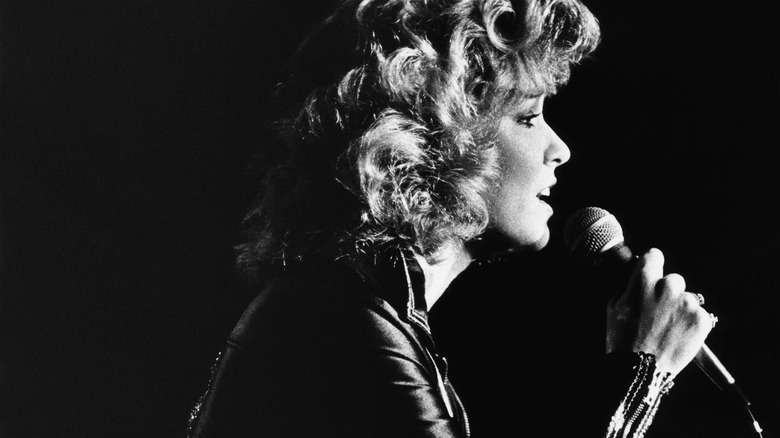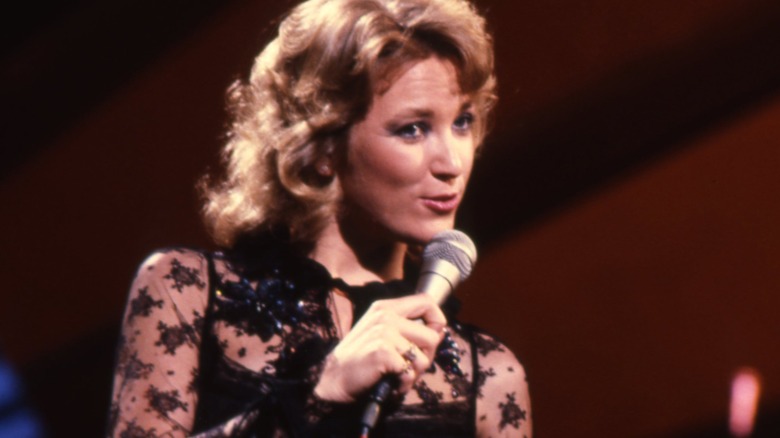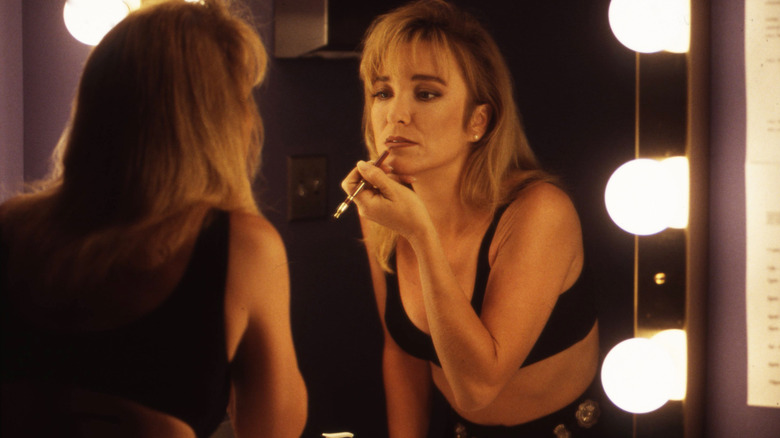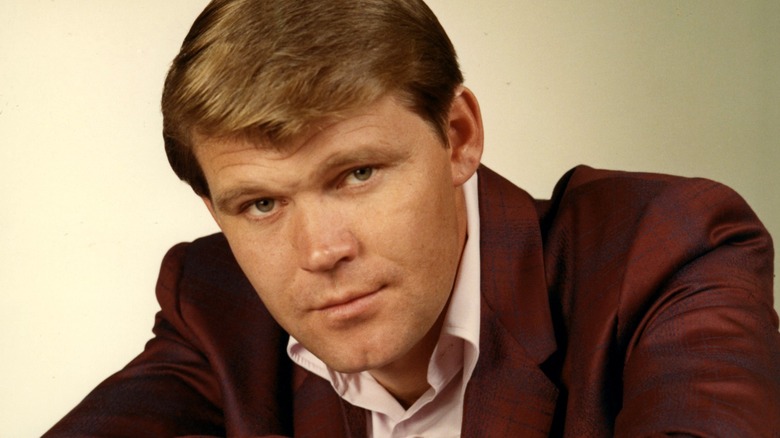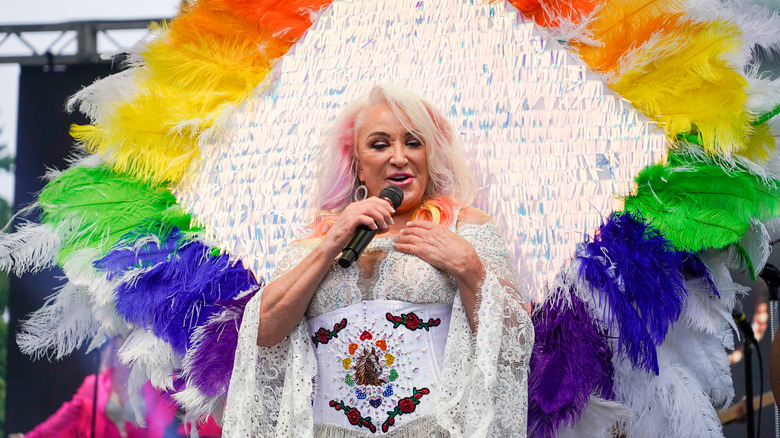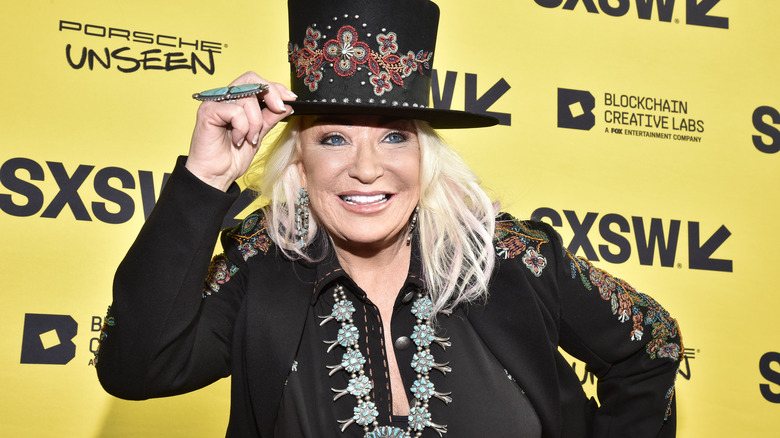The Untold Truth Of Tanya Tucker
Was she a superstar who proved more difficult to deal with ... or a country music powerhouse who was every bit the outlaw as her contemporaries, who were viewed quite differently because they were men? That's the question posed by The New York Times amid Tanya Tucker's 2019 release of her first original album in 17 years, and when they talked to her and her songwriting partner, Brandi Carlile, they found that it was also at the heart of their work. Carlile explained: "Can we uphold this person's art and legacy in the same way that we do to the men that we love so much?"
By the 1970s, her lifestyle — addiction, all-day-and-all-night parties, and sometimes violent relationships — had overshadowed her music. While she was fond of saying that it didn't really bother her, she was also the first to point out that not even Johnny Cash made headlines quite like she did. And it was something her father had warned her about, way back when a pre-teen Tucker first told him that she wanted to sing. He told her she was going to have two issues: "One is you're a girl, and the other one is you're a 9-year-old girl. You're going to have to sing with more feeling, or they're not going to believe it."
And she did, becoming one of the most vocal female stars of the outlaw country movement. It wasn't all smooth sailing, though, and here's what even her biggest fans might not know.
Her parents didn't believe she could sing
Tanya Tucker came from a very close-knit family, and for years, they stood right alongside her as she made her mark in music history. That was particularly true of her father, Beau (sometimes spelled Bo, pictured), who was her longtime manager (via Rolling Stone).
He wasn't always her biggest fan, though, and when Rolling Stone did some touring with Tucker and her family for a piece in 1974, they spoke with Beau about how her career started. He recalled: "I never even thought about her singing till one day she walked up and said, 'Daddy, you wanta hear me sing a song?' I said, 'Sweetheart, you couldn't sing your way out of a paper sack.'"
He said that she proved him wrong right then and there, and adds that she always knew what she wanted. He was more than happy to take her to local concerts, and big names like Mel Tillis would invite the precocious 9-year-old on stage to sing. It wasn't long before she became known as the Girl with the Golden Voice, Rolling Stone reporter Chet Flippo wrote that it quickly became clear that it wasn't a case of parents pushing their daughter into a life of child stardom, but of a young woman who knew what she wanted and was going to get it. Beau Tucker explained, "We just let her breeze along and do it the way she wants to."
Tanya Tucker's breakout hit has an eerie origin story
Tanya Tucker was just 13 years old when she recorded what would become her breakout hit. Recorded in 1972, just a few weeks after she signed her first recording contract, "Delta Dawn" wasn't written for Tucker — and she wasn't even the first to sing it. Her producer had heard Bette Midler's version, and Midler had gotten it from Tracy Nelson, who had been one of the backup singers for the first recording.
That had been made by one of the song's two writers. Alex Harvey and Larry Collins had also been child stars, and it was Harvey who first recorded it — and recounted the eerie origins in "Chicken Soup for the Soul: Country Music Edition" (via Rolling Stone). He had been 15 years old when he was slated to appear on a television show. Afraid his mother might be embarrassing, he wouldn't let her accompany him. When he got home, he learned that she'd gotten drunk and been killed when she drove her car into a tree.
About 10 years later, he was sitting up in a wee-hours-of-the-morning situation when he felt his mother's presence. She then appeared to him — sitting in a rocking chair across the room — and the vision was so clear it not only inspired him to finish the song, but it only took him and Collins about 20 minutes. Tucker's version would get her a Grammy nomination — her first, at 14 years old.
Surrounded by a protective family, she doesn't trust anyone else
Tanya Tucker lost her beloved father in 2006, and summed up both their relationship and the impact his passing had on her to Rolling Stone: "I cannot ever trust like that again."
Parents are often an invaluable part of a child's life, but for the Tucker family, it was a little bit different. When Rolling Stone shadowed the then-15-year-old Tanya (pictured with her mother in 1990) on her cross-country tours, they noted that she was never allowed to be alone. One of her family members — or one of a handful of trusted friends — was always with her. That even extended to stops in public bathrooms, where her 30-year-old brother would go with her, ask anyone else to leave, and make sure she was safe. The family cited kidnapping worries, and a certain section of her fandom as particularly worrying. Who? People like the man that started following them in Arkansas, and remained a shadow for two weeks until he fell asleep at the wheel and ended up crashing his car.
Was it as frustrating as it sounds? She explained that while sometimes it did get to her, "Sometimes when I'm alone, man, I go outta my head. I mean, I like to be alone with someone I know ... but I get kinda tired when people come up and ask for your autograph when you just wanta have fun or somethin'. That's the way it goes, I guess."
Tanya Tucker rejected Elvis — repeatedly — as a teenager
Elvis might be credited with helping to shape the Golden Age of rock and roll, but there are plenty of less-than-reputable things that have come out about him in the years after his death. That, of course, includes the fact that he preferred to date girls that were no older than 15, and at the time, Tanya Tucker fit the bill. She was on "Watch What Happens Live with Andy Cohen" when a caller asked her if the stories about her rejecting Elvis were true, and she said they were.
She recalled going to one of his concerts: "My dad told me, as I was leaving the trailer that night, going to the Elvis show at the Hilton, he said, 'Now, look here, that boy can have any girl he wants in the world,' he said. 'Make sure he knows he can't have you.'" Just saying no once wasn't a clear enough message, and Tucker said that he kept pursuing her. "He constantly asked me to come to Graceland, but I never did, because I didn't want to be one of the girls."
That was a fairly recent confirmation that came in 2019, but it wasn't the first time Tucker had shared her thoughts on the king. She told Rolling Stone back in 1974, "I wanta think that Elvis is perfect," she said. When the reporter suggested then that maybe she shouldn't meet him, she responded: "You're right."
Did she regret never having a normal childhood? No.
By the time she was in her 20s, Tanya Tucker had turned into tabloid fodder and a bit of a cautionary tale for parents who were considering raising a child star. According to The Columbus Dispatch, her headlining brawls and rocky relationships have tarnished her legacy a bit. So, does she regret it?
She says that her father told her that it was her decision: She was 9 years old when he asked if she wanted to be a regular kid, or if she wanted to make a run at being a singing sensation. She said the answer was always clear.
Tucker felt that way when she was a teenager, too. She was 15 when she told Rolling Stone that there wasn't much that she felt like she had to miss about having a normal childhood, especially when her days were packed full of performances and experiences not many others had. There was the occasional dance that made her a bit regretful she wasn't going, but she was thinking ahead, too: "But really, where will those kids be five years from now? What will they be doing? I just wouldn't be satisfied with a $75-a-week job as a secretary or something. We need 'em, but I just wouldn't be satisfied."
Tanya Tucker's original plans were pretty different than how her life turned out
It's what every kid is asked at least once a week, in spite of the fact that many adults don't even know the answer to the question: "What do you want to be when you grow up?" Tanya Tucker may have known she wanted to be a singer from the time she was incredibly young, but according to what she told Rolling Stone way back in 1974, that wasn't her entire plan. The then-teenage Tucker had come up with an impressive life plan, which started with — maybe — releasing a pop album. But music wasn't everything, and she had dreams of being able to support herself on just the occasional performance rather than the sorts of tours that saw her singing every night in a different city.
"I would like to get married, maybe when I'm 18, and then I'd like to semi-retire," she'd told them. "I'd like to do one date for $20,000, and then come back and go fishin' and raise my cattle and horses. I'd like to be able to turn down a show to go to a horse show instead."
At the time, she was already being called the "female Elvis," and where is there to go from there?
Kevin Costner is the one man she'd marry
While 15-year-old Tanya Tucker may have had dreams of getting married and settling down, she would later tell Dan Rather in 2016, "It just didn't work out for me." Tucker candidly talked about her fears of marriage, saying that she had seen so many end in divorce that she never wanted to risk it — and it was a hard thing for her to come to terms with. That said, she had always intended on being a mother and had nothing but pride in her three children, although she did clarify that there was one man she would have considered tying the knot with: Kevin Costner.
They had met and hit it off, bonding over their shared love of music. "It was a really special night," Tucker explained. "I met his fiancée that night, and of course, they went and got married and have three kids. But if there was another one around like him...!"
Tucker's feelings for Costner weren't all missed opportunities, though, and says that he still shows up on her bucket list a few times. She would love to be in a movie with him, she said, and she would also love for him to appear in a music video with her.
Her biggest regret was an attempt to cross country and rock
It's hard to imagine that someone with a career like Tanya Tucker's would look back on anything with regrets, but according to what she told Texas Monthly in 2009, there was something major that she wished she had never done.
Her first number one came in 1973, and although she said she wouldn't have replaced her father-manager with the most experienced promoter in the world, she acknowledged, "My dad didn't know anything about managing, you know? He did a great job, but we had no outside support." So, in 1978, she was signed by a California agency to do a country/rock crossover album, and while it seemed like a great idea (and cost around half a million to make), it flopped. "This is probably my biggest regret," she explained. "Unfortunately, the promotion was better than the record, and it all backfired on me."
She also explained how shady they had ended up being. Written into her contract was an out: If her album didn't go gold by a certain date, she was free to walk away. Wanting to try to keep her for another album, she says they spray-painted an Elton John record gold and gave it to her, trying to convince her that it was hers. It didn't work, but it did leave her mired in lawsuits and legal troubles. "I won the lawsuit, but I lost because I had to fight them."
Tanya Tucker called Glen Campbell the one that got away
Tanya Tucker dated the Rhinestone Cowboy himself in 1981, for a very, very short time. According to Variety, it was a high-profile and volatile relationship that Tucker never truly got over, and when Campbell passed away in 2017, she released a song dedicated to him. It was called "Forever Loving You," and it made all kinds of headlines again when she promised to donate some of the proceeds to the Alzheimer's Foundation of America.
Tucker and Campbell were in the headlines again, and not everyone was a fan. Campbell's widow, Kim, was married to the singer for 35 years, and condemned Tucker's display (and declaration of love) as "callous and disrespectful." In addition, she called their one-time, decades-old relationship a "distorted fairy tale," with TMZ reporting that she was outraged when Tucker performed the song on live television, and was given all the condolences that should have gone to the grieving widow and their children.
Tucker did respond, saying that she hadn't met his widow, but that she hadn't meant any harm in releasing the song. "Nobody didn't love Glen Campbell," she said. "I thank [Kim] for taking care of him, you know? ... I have no bad blood. She may, but I don't."
Glen Campbell's account of the relationship was a bit different
Tanya Tucker's fling with Glen Campbell (pictured) was probably one of the most famous relationships in country music, and Tucker has had a lot to say about just how much she loved Campbell in spite of their difficulties. (At the time they dated, Campbell had his own challenges: The New York Times quoted his autobiography as saying, "I didn't have a career. My career had me," and calling cocaine his "personal demon.")
In 1994, Campbell did a pretty no-holds-barred interview with the NYT, and talked about his relationship with Tucker. He didn't pull any punches, saying: "Tanya was and is for Tanya. Every sentence she utters begins in one of several selfish ways: 'I am... I think... I will... I want.' ... My time with Tanya was turbulent, the most chaotic period of my life."
Campbell says that there were a few incidents that stood out to him, and claimed that she had once attempted to slit her wrists while high. Another time, he claimed, she had walked through a plate glass window. Although he said that he had nothing but admiration for her talent and wished her nothing but the best in the future, he also called it "a poisoned relationship," and added, "I wish I hadn't had that relationship."
She credits God for her success — and guiding her
NPR says that Tanya Tucker also says that she has a deeply spiritual side, too. When asked about her long career and the new music that came out in 2019, Tucker said she only had one explanation for it: "I just kind of let go, let God. That's the name I choose to call my higher power, and I let him rock through me because the one thing I do know after all these years is that I'm not doing it by myself. It's coming through me. And there's a reason for that. I don't know what it is, but I just know that it is."
As Parade notes, her 2019 album came 17 years after her previous one, and she'd had some serious heartbreak in the meantime, with the loss of both her parents. Still, she said that she believed it was God who had other plans for her, and sent her a few signs.
One was teaming up with singer/songwriter Brandi Carlile, and Waylon Jennings's son, Shooter Jennings. The other was opening her own exhibit at the Country Music Hall of Fame and Museum. She told The Tennessean that she had been on the verge of taking some down time just to travel and hang out with her daughter — and finally buy that ranch — when the exhibit came: Or, as she calls it, "God's way of telling me to get back to work."
Here's what Tanya Tucker wants her legacy to be
It's human nature to want to leave something behind when we're no longer here, and Tanya Tucker has spoken about what she wants her legacy to be. She told ET: "My career, as you know, has had its ups and downs and it's just life. I survived. ... I just want to be the best I can be. I definitely would want someone saying about me when I'm gone, 'You know, she could sing pretty good, but she was a great gal.'"
Tucker says that her 2019 album, "While I'm Livin'," was a chance for her to share a message she'd wanted to write and sing about for a long time, and was finally able to with the help of songwriters Brandi Carlile, and Tim and Phil Hanseroth. The album — and particularly the song "Bring My Flowers Now" — is about how everyone should do precisely that. Tucker wants everyone to know that they shouldn't wait until someone's funeral to send them flowers, and they shouldn't wait until there's a death in the family to get together with loved ones.
"If you've got something to say to somebody, you should bring them flowers now," she explained to Parade. "It's a waste of flowers to bring them when they're gone."
